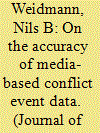| Srl | Item |
| 1 |
ID:
166342


|
|
|
|
|
| Summary/Abstract |
Energy performance certificates (EPC) were introduced in European Union to support reaching energy efficiency targets by informing actors in the building sector about energy efficiency in buildings. While EPC have become a core source of information about building energy, the domains of its applications have not been studied systematically. This partly explains the limitation of conventional EPC data quality studies that fail to expose the essential problems and secure effective use of the data.
|
|
|
|
|
|
|
|
|
|
|
|
|
|
|
|
| 2 |
ID:
187854


|
|
|
|
|
| Summary/Abstract |
National energy consumption data are typically adjusted upward and provincial revision downward based on the Third Economic Census, thus substantially reducing energy statistical discrepancy between China and its provinces. Examining revision effects can facilitate better understanding whether and how the revision process eliminated the fundamental roots of the discrepancy. Through multiple index decomposition methods, this study traced the overall discrepancy to raw coal consumption by energy source, coal washing by transforming process and industrial consumption by economic sector. The reduction of the discrepancy was primarily based on improvements in the data consistency for raw coal, including the input by coal washing and industrial raw coal consumption. At provincial level, unexpected operations were detected during benchmark revisions, particularly inner-provincial inconsistency and inter-provincial incoordination. We conclude that the data discrepancy was institutionally rooted and cannot be solved by benchmark revision alone. Shifting the statistical system from a hierarchical regime to a more centralized one, which would allow greater coordination during energy data accounting and revisions, can help resolve this issue fundamentally.
|
|
|
|
|
|
|
|
|
|
|
|
|
|
|
|
| 3 |
ID:
171277


|
|
|
|
|
| Summary/Abstract |
Data quality in survey research remains a paramount concern for those studying mass political behavior. Because surveys are conducted in increasingly diverse contexts around the world, ensuring that best practices are followed becomes ever more important to the field of political science. Bringing together insights from surveys conducted in more than 80 countries worldwide, this article highlights common challenges faced in survey research and outlines steps that researchers can take to improve the quality of survey data. Importantly, the article demonstrates that with the investment of the necessary time and resources, it is possible to carry out high-quality survey research even in challenging environments in which survey research is not well established.
|
|
|
|
|
|
|
|
|
|
|
|
|
|
|
|
| 4 |
ID:
141193


|
|
|
|
|
| Summary/Abstract |
Empirical researchers of civil war rarely collect data on violence themselves and instead rely on other sources of information. One frequently used source is media reports, which serve as the basis for many ongoing data projects in the discipline. However, news reports rarely cover a conflict comprehensively and objectively and may therefore be prone to various reporting issues. This article provides an analysis of the accuracy of information given in news reports. In particular, if focuses on two types of “hard facts” that event data sets require: the location of an event and its severity. By linking media reports to firsthand accounts from a military database, the article does two things: (1) it analyzes the determinants of inaccuracy and confirms the expectation that events with a low number of observers tend to have higher reporting inaccuracies and (2) it assesses the magnitude of these inaccuracies and the implications for conducting empirical analyses with media-based event data.
|
|
|
|
|
|
|
|
|
|
|
|
|
|
|
|
| 5 |
ID:
117627


|
|
|
|
|
| Publication |
2013.
|
| Summary/Abstract |
The Defense Manpower Data Center (DMDC) of the US Department of Defense conducted a survey of active duty spouses in 2006. In Notes Regarding the 2006 Survey of Active Duty Spouses, Willard C. Losinger suggests that "Severe problems existed with the sampling, weight adjustments, and estimation (including variance-estimation) procedures." DMDC's review of these claims has revealed that Losinger used a preliminary data set with incorrect weighting variables to conduct his analyses. This data set was not used in any of DMDC's published results. Therefore, the article's claims about the quality of DMDC's published data and survey methods lack the necessary empirical support to be useful in improving the DMDC survey program.
|
|
|
|
|
|
|
|
|
|
|
|
|
|
|
|
| 6 |
ID:
109918


|
|
|
|
|
| Publication |
2011.
|
| Summary/Abstract |
The Stockholm International Peace Research Institute (SIPRI) and the International Institute of Strategic Studies (IISS) both publish datasets on military expenditure that are widely used by scholars and military analysts. This article illustrates the limitations in the reliability and validity of these data, using a case study of contemporary Venezuela to highlight the issues. There is a debate over recent Venezuelan military expenditure under President Chávez: some argue that the expenditure has increased dramatically; others argue that it has not. The SIPRI and IISS datasets ought to be tailor-made for resolving this debate, but the estimates they provide are significantly flawed: military spending is reported to be quite low and to have declined as a percentage of GDP. New evidence presented in this article suggests that Venezuela's recent military expenditures were typically at least 20% to 70% higher than the estimates provided by SIPRI and IISS. Moreover, the military expenditures have at least kept pace with GDP growth as oil revenues increased over the period 2002-08. A key source of the discrepancy in the estimates is the way in which extra-budgetary purchases, especially of foreign arms and supplies, are treated. In some states, such as Venezuela in recent years, extra-budgetary purchases are responsible for a large portion of the expenditure, but these purchases are frequently not captured by standard data sources.
|
|
|
|
|
|
|
|
|
|
|
|
|
|
|
|